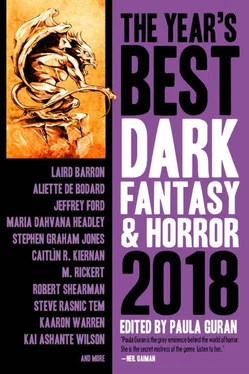I’d reduced in weight during in the sixmonth I’d spent an invalid, plagued by visions and panics, surrounded by delicate pieces of dark. This in spite of the midnight meals I’d consumed—no, nothing to speak on, nothing to think on. They had not fed me.
Now I was here. This was a cure, or so a medium in New York had told me.
“Go to this daguerreotypist,” said the woman met in a district otherwise filled with stables and snorting animals, passing me a card with an address. She was in the upper quarters, a gown of dark pink embroidery, a face like a crystallized fig, all folds and sugary creases, poisonously edible. “Hire him to take your portrait.”
A photographer of ghosts. There was a fashion toward such things at that time, but this studio, that of Masury & Hartshorn, was particular. Both of the main photographers there were of unusual lineage, she told me. Messr. Hartshorn was a stag turned man by a jealous god two thousand years before, and Messr. Masury was the son of a ghoul, but, by all accounts, tremendously polite. They ran a specialist studio. There was a photographer there, this medium swore, who might use the camera to save my soul, if anything remained of it. His name was whispered in these circles, though it was not one the studio advertised.
That was why I had come here, at considerable peril, and this was my aim. A session that would save me. A portrait that would free me from the burden I carried.
The man I was to meet was called Edwin Manchester, an apprentice who had come to photography from the spiritual movement. He was well known in the circles I’d come to rely upon, and had, according to the medium, purged one Miss Valpareille of a demon that had taken up residence inside the chambers of her heart. His method of photography extracted whatever creature had nestled within the person being photographed.
If there was a stowaway inside my body, this portrait would snatch it out. The portrait, then, would depart with me, and though it was necessary I keep it under lock and key, the stowaway would be trapped inside it for as long as the portrait existed. So I hoped and so I prayed. I could not spend my nights the way I’d spent them of late.
The mistress leaned back in her chair. I noticed a woven bracelet around her wrist, the same platinum as her own tresses, twisted into a complicated pattern, a mourning bracelet, but for the large gemstone at the center, wreathed in hair. A star sapphire. The star gleamed in the same way her eyes did. It was not from here. A sailor for her too, it seemed, someone who’d raided a faraway treasure, or traded with a woman for her jewels.
“Best to close the curtains,” the innkeeper said, calmly as though she were telling me she’d prepared hot milk to better my sleep. “Men may come out from the water at night, and you would rather they not see you, though if you desire you may look out from behind the drape.”
“Men?” I asked. “What men? The men from the town? From a ship?”
She spoke as though what she said was nothing strange, nothing the least unusual, and in truth, my recent history had convinced me there was nothing impossible in the world, that anything might happen, and to anyone.
“There is a ship anchored in the bay. Out of it come explorers, drenched and walking inland toward the light of the town. They carry lanterns, and come bearing maps, but the maps do not depict any place the barmen have heard tell of, nor do they reveal any mark in their topographical lines to remind one of anything near here. Drear, the men are, dressed in creamy silk waistcoats, and long black tails. With the dawn they walk back into the water.”
“I had not realized I was to hear of ghosts,” I commented, mildly enough, but the story, I worried at like a knot. I’d heard stories before, and some of them were true. I lived in the center of a narrative that no reasonable person would perceive as plausible. This one, that of a ship of the dead, chilled me. I had known other stories about ships.
I peered out into the street and saw all sorts of men with all sorts of countenances, all in their dark and drear, all with their eager eyes and long mustaches, but none of them came out of the bay.
“One always hears of ghosts at this time of the year,” she said, and shrugged. “The season is turning dark and the storms are upon us. The living walk beside things that would be stricken by sunlight. Now it is time for your tale, Mrs. MacFarlane, for it is clear you have one.”
I flinched, my sherry sloshing in my glass. The bones of my corset oppressed me and I felt as though I’d been caged inside a skeleton not mine own. Perhaps it was that of a whale, and I was a Jonah, adrift and punished by God. I put the glass to my lips and drank the balance.
“Tell me why you’ve come here, to this town on the water. The wind is cold, and the streets full of trouble, and no one comes without a reason. Will you sell your soul as a stowaway? Will you go to Thule?”
“Thule?” I asked, my heart racing with that word. “What do you know of Thule?”
She tilted her head, appraising me with the attention of a jeweler looking through a loupe.
“Tell me your tale, and I shall tell you.”
I had never spoken of Thule, nor had I heard tell of it from anyone but the notorious one who haunted me, the minder of my misery.
The innkeeper tilted the decanter, and sherry filled my glass again. I looked at her slender figure, her strangely ageless countenance, and though I had kept mine own counsel for twenty years, her mention of Thule persuaded me. I found myself confessing my sorrow to her.
“I will not sell my soul, no, for it is not mine to sell at present. To Thule, though, I may be bound.”
I had never told this tale to anyone, or no one beside the medium, and she only in the utmost desperation, my skin heaving and quivering, my burden boiling my blood. I would begin.
The Lady’s Tale, First Part
“This is my soul, then, and this the history of my trouble, the history of the Thule I know too well. My second cousin was twenty-five years my senior, and his announcement at my birth that I was to be his wife, and that he would devote himself to the welfare of the family, stirred my parents. On my fourteenth birthday, a carriage arrived at our house, and my mother stood on the roof of our building looking down as my cousin’s manservant settled me into the cushions, my small trousseau, my books and belongings.
I went to my bedchamber in his house uptown, dined with him twice, and then he was gone to his business, traveling by ship to the far North for the next year.”
Thus far, my story was nothing strange to the innkeeper, a trouble known to women, perhaps not terribly different from her own.
“He was lost at sea?” she prompted.
“Not in the usual fashion. My husband returned to me a hard shadow of his former self, mustache white, though it had been black when he left New York. He came into the house, and I came down the front stairs to meet him. I was there when he opened his trunk. Something unfolded out of it, stood in the center of our foyer, and looked at me with burning eyes.
“I am dreadfully sorry, dear Cousin Annabel,” said my husband to me, and there was no emotion in his voice. “But on my voyage, I have made the acquaintance of a new master.”
I looked at my husband, and at the thing standing beside him. It was tall and slender, with an excess of fingers, dressed in a long black coat, which I remembered as having belonged to my husband. There was the pale blue monogram I had embroidered, on the collar. Beneath the hem of the coat I could see hooves, and a lashing tail, somewhat feline, somewhat… else.
Had my husband met the devil at sea? I did not love my husband. I scarcely knew him. He was an old man and I was only a girl. This, though, was nothing I desired for him, nor for myself.
Читать дальше












